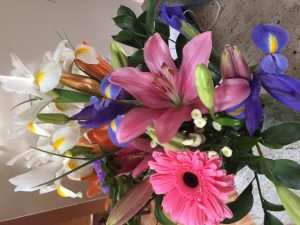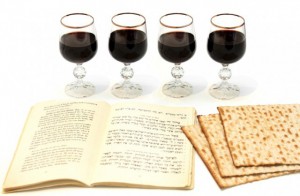Spring welcomes us with sunshine and new colors. Life is infused with hope again. Passover is the holiday of Spring and freedom. It is also the holiday of new beginnings, asking questions and telling stories. It is time to come together and share with others. We eat unleavened bread (Matzah) as a reminder to let go of old “sticky” habits. Here are some Passover ideas to bring to Seder .Enjoy!

1. Ask New Questions
Although it is fun to sing the traditional four questions and do traditional things, many people become bored and tune out hearing the old story for decades. To generate engaging discussions around the table try to ask new questions. What questions would you ask? What questions other have? For example: Name four highlights related to new beginnings in the last year? What are some personal experiences or events that are related to freedom and what experiences are related to oppression?
2. Put the Say in Say-der (Seder)
Hagadah, the book we read at the Seder, literally means to tell. This year try more telling and less reading. For example, use the the four cups of freedom to talk about the stages and the kinds of freedom. The Hebrew name of the holiday Pesach, as pointed out to to us by a Hassidic Rabbi, can also be understood as related to telling. If we divide the word in to 2 words: Peh-sach, it means mouth-speaking/telling.
Give yourself permission to leave the usual script and improvise on the many themes of the holiday. Dare to be dramatic! For example, tell stories about your own life and talk about world events in the past year that relate to the themes of freedom and bondage.
3. Becoming Less Sticky or Stuck
If Passover is the holiday of freedom and liberation, why is the food we eat is binding? With the awareness of sustainable and healthier lifestyle, our diet is also an expression of our choice to be more free. Some people are adapting a gluten free diet, which in my sensibility relates to the Passover theme of freedom and becoming less sticky.
We know now that some foods are “sticky” (hence the ingredient is called glue-ten) and cause inflammation. Over the years I have adopted a Passover diet rich in vegetables, fruits and protein and less grain. I especially try to consume less Matzah.
4. All are welcome – Kol Dich’fin
Kol dich’fin, in Aramaic means all are welcome. When we make plans for the seder each year we ask, who else can we invite? On this holiday of freedom we ask how can we be the force for good in the world and share in our liberation? We count our blessings and extend our thanks by sharing an evening with people who we don’t know well, or people who are alone, had a hard year and can use the invitation to be included, dream of freedom and have a respite for one night.
We care and share with others with the tradition of kol dich’fin, all are welcome. We let people know there is always room at our table. Small gestures; opening our doors, sharing a meal with others, are actions to help heal and mend our world.
 Passover
Passover